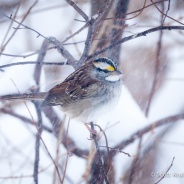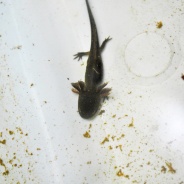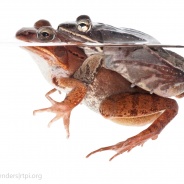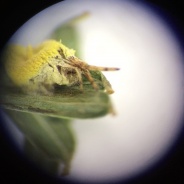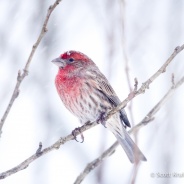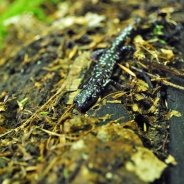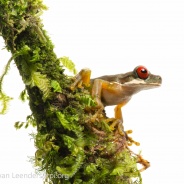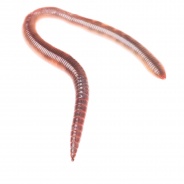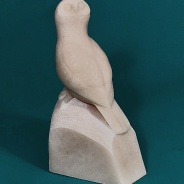I love this time of year. After the exuberance of summer and the vibrant colors of fall, I’m thankful for the days growing shorter. The nights longer. Temperatures falling. Silhouettes of bare branches against a leaden sky promising snow. All of nature winding down. Encouraging quiet. Reflection. Introspection. [more]
White-throated Sparrow
Here is a photo of a White-throated Sparrow (Zonotrichia albicollis) toughing it out in a recent snowstorm. Despite the fact that we were in the middle of February, this bird was already sporting its spring courting plumage; evidenced by its bright white throat and vibrant yellow lores. This is one of the first species you can expect to hear singing at the end of winter; their “oh-sweet-Canada” or “poor-Sam-Peabody” tune resonates from the brush. In some cases you might see White-throated Sparrows year-round –...
read moreDragons of the Northeastern Forest?
Do you still consider yourself to be a kid at heart? I definitely have my own “kid” moments when I’m out in the field flipping logs or dip netting pools to see what may be living beneath the surface of the forest floor or a body of water. One species in particular that I love to find in our northeastern forests is the spotted salamander (Ambystoma maculatum). Known for their large black bodies spotted with bright yellow dots, this charismatic species is hard to miss when out in the open. However, they are typically only seen...
read moreFrost Free Frogs?
“The animal kingdom relies on staggering evolutionary innovations to survive winter.” Bernd Heinrich renowned biologist and author – made this statement in his bestselling book entitled “Winter World”. The Wood Frog (Rana sylvatica) is a true embodiment of this statement; these tiny amphibians can survive for weeks with an incredible two-thirds of their body water completely frozen—to the point where they are essentially solid frogsicles! The adaptation that enables this remarkable feat is known as a cryoprotectant – a substance that...
read moreWhy Are Eastern Hemlock Trees Irreplaceable?
Perspective from RTPI’s conservation intern, Heather Zimba I think many people would agree that spending time walking in a forest can be therapeutic, being completely enveloped by the landscape’s vegetation and wildlife. I’ll bet that – if you like the outdoors – you can close your eyes right now and visualize the areas you most like to visit. One of my favorite places is a small gorge that contains a stream with beautiful natural waterfalls. The steep banks of the gorge are lined with deep green evergreen trees that...
read moreZombie Fungus?
During a recent Hemlock Woolly Adelgid survey, one of our volunteers found a little yellow blob attached to a hemlock twig. The mass was clearly not HWA, but curiosity prompted me to bring it back to the office for examination. A closer look under the microscope revealed that the blob actually consisted of a powdery fungus encapsulating a dead spider! After a bit of research, I came to suspect that it might be some sort of Cordyceps; a genus of parasitic fungi capable of taking control of an arthropod, thus directing it to navigate to a...
read moreMale House Finch
Here is a recent photo of a male House Finch (Haemorhous mexicanus) on a snowy afternoon. The beautiful red shades of this guy really stand out against the drab surroundings, and their cheery songs can already be heard here in February on some of the warmer, sunnier days. It is one of the first signs of “spring” as the days began to grow longer. The Purple Finch (Haemorhous purpureus) is a similar species and often confused with the House Finch, especially because both enjoy coming to backyard bird feeders. Roger Tory Peterson...
read moreSlimy Salamander (Plethodon glutinosus)
There’s always that one subject that is particularly challenging to photograph, and for me it’s the Slimy Salamander. They live in dense forests where the light is quite low and they quickly retreat from bright light, so without a high shutter speed your chances of capturing these secretive salamanders is next to none. What’s more, their jet black body and eyes makes it difficult to get the focus just right. And if you try to move them into a better position, your fingers get coated in their gooey secretions and then you...
read moreTreasures of the Tropics
In less than two weeks an RTPI crew will be headed to Costa Rica again, this time with students from the Forman School. Students will participate in a variety of research projects, including migratory bird banding and monitoring endangered and recovering amphibian populations, such as this Rufous-eyed Brook Tree Frog (Duellmanohyla rufioculis). Stay tuned for more information soon!
read moreAmazing Line-Up For National Invasive Species Awareness Week
Trying to combat cabin fever this winter? Looking for some interesting and educational events to attend? Between February 27th and March 4th, RTPI is partnering with the Western New York Partnership for Regional Invasive Species Management (WNY PRISM) to host a series of events at our Jamestown headquarters in recognition of National Invasive Species Awareness Week. The schedule for the week is as follows: Monday February 27th at 6pm-“Bird and Invasives” Guest Lecture by Andrea Locke, WNY PRISM Coordinator Wednesday March 1st at...
read moreArtist Dale Weiler Creates Snowy Owl Sculpture to Benefit RTPI
We are very excited to announce the release of a new bronze sculpture created by Dale Weiler to support wildlife conservation programs underway at RTPI. The bronze, “Elevated Perspective”, is a 9-inch rendering of a snowy owl, one of Peterson’s favorite species to paint and the icon for RTPI. It is also the first bronze Dale has created in the last ten years. Dale and his wife, Loti, are donating 100% of the profits to RTPI’s ‘Project Wild America’ initiative – a program which promotes experiencing nature in your own backyard. The...
read more



